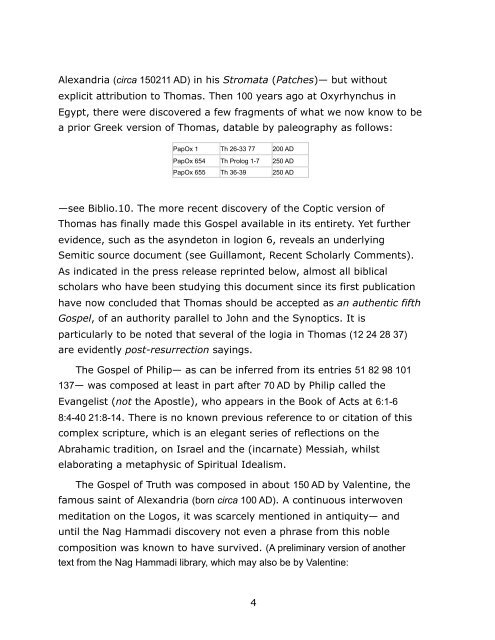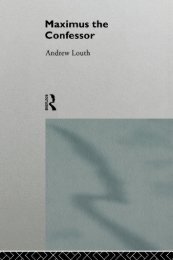Gospels of Thomas and Philip and Truth - Syriac Christian Church
Gospels of Thomas and Philip and Truth - Syriac Christian Church
Gospels of Thomas and Philip and Truth - Syriac Christian Church
You also want an ePaper? Increase the reach of your titles
YUMPU automatically turns print PDFs into web optimized ePapers that Google loves.
Alex<strong>and</strong>ria (circa 150211 AD) in his Stromata (Patches)— but without<br />
explicit attribution to <strong>Thomas</strong>. Then 100 years ago at Oxyrhynchus in<br />
Egypt, there were discovered a few fragments <strong>of</strong> what we now know to be<br />
a prior Greek version <strong>of</strong> <strong>Thomas</strong>, datable by paleography as follows:<br />
PapOx 1 Th 26-33 77 200 AD<br />
PapOx 654 Th Prolog 1-7 250 AD<br />
PapOx 655 Th 36-39 250 AD<br />
—see Biblio.10. The more recent discovery <strong>of</strong> the Coptic version <strong>of</strong><br />
<strong>Thomas</strong> has finally made this Gospel available in its entirety. Yet further<br />
evidence, such as the asyndeton in logion 6, reveals an underlying<br />
Semitic source document (see Guillamont, Recent Scholarly Comments).<br />
As indicated in the press release reprinted below, almost all biblical<br />
scholars who have been studying this document since its first publication<br />
have now concluded that <strong>Thomas</strong> should be accepted as an authentic fifth<br />
Gospel, <strong>of</strong> an authority parallel to John <strong>and</strong> the Synoptics. It is<br />
particularly to be noted that several <strong>of</strong> the logia in <strong>Thomas</strong> (12 24 28 37)<br />
are evidently post-resurrection sayings.<br />
The Gospel <strong>of</strong> <strong>Philip</strong>— as can be inferred from its entries 51 82 98 101<br />
137— was composed at least in part after 70 AD by <strong>Philip</strong> called the<br />
Evangelist (not the Apostle), who appears in the Book <strong>of</strong> Acts at 6:1-6<br />
8:4-40 21:8-14. There is no known previous reference to or citation <strong>of</strong> this<br />
complex scripture, which is an elegant series <strong>of</strong> reflections on the<br />
Abrahamic tradition, on Israel <strong>and</strong> the (incarnate) Messiah, whilst<br />
elaborating a metaphysic <strong>of</strong> Spiritual Idealism.<br />
The Gospel <strong>of</strong> <strong>Truth</strong> was composed in about 150 AD by Valentine, the<br />
famous saint <strong>of</strong> Alex<strong>and</strong>ria (born circa 100 AD). A continuous interwoven<br />
meditation on the Logos, it was scarcely mentioned in antiquity— <strong>and</strong><br />
until the Nag Hammadi discovery not even a phrase from this noble<br />
composition was known to have survived. (A preliminary version <strong>of</strong> another<br />
text from the Nag Hammadi library, which may also be by Valentine:<br />
4




